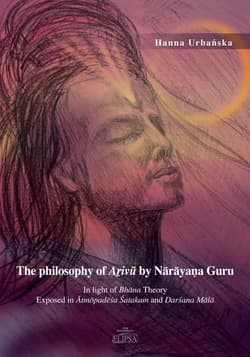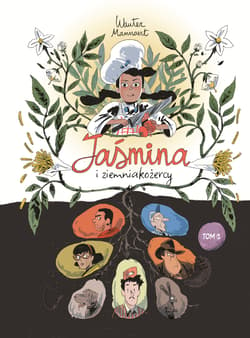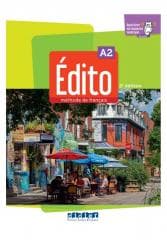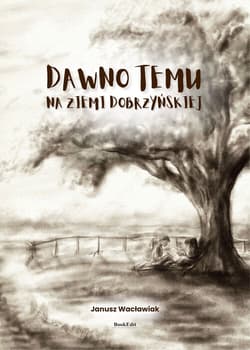Hanna Urbańska
31,42 zł
Najniższa cena z 30 dni przed obniżką.
33,60 zł
- sugerowana cena detaliczna
Hanna Urbańska
Książka. Okładka broszurowa (miękka)
31,50 zł
Najniższa cena z 30 dni przed obniżką.
42,00 zł
- sugerowana cena detaliczna
Hanna Urbańska
Chwilowo niedostępny
Książka. Okładka twarda
Bestsellery
34,59 zł
Najniższa cena z 30 dni przed obniżką.
57,65 zł
- sugerowana cena detaliczna
6,6 (117)
Książka. Okładka twarda
44,99 zł
Najniższa cena z 30 dni przed obniżką.
59,99 zł
- sugerowana cena detaliczna
Tomasz Awłasewicz
Książka. Okładka broszurowa ze skrzydełkami
31,45 zł
Najniższa cena z 30 dni przed obniżką.
49,99 zł
- sugerowana cena detaliczna
Artur Nowak
6,7 (3)
Książka. Okładka twarda
23,70 zł
Najniższa cena z 30 dni przed obniżką.
34,99 zł
- sugerowana cena detaliczna
Opracowanie Zbiorowe
Książka. Okładka broszurowa (miękka)
35,29 zł
Najniższa cena z 30 dni przed obniżką.
54,90 zł
- sugerowana cena detaliczna
Iwona Jaworska
7,8 (53)
Książka. Okładka broszurowa ze skrzydełkami
32,99 zł
Najniższa cena z 30 dni przed obniżką.
54,99 zł
- sugerowana cena detaliczna
Artur Nowak,
Arkadiusz Stempin
6,1 (35)
Książka. Okładka twarda
35,79 zł
Najniższa cena z 30 dni przed obniżką.
54,90 zł
- sugerowana cena detaliczna
Natalia Kulpińska
Książka
33,99 zł
Najniższa cena z 30 dni przed obniżką.
54,90 zł
- sugerowana cena detaliczna
Mariola Lorek
8,3 (32)
Książka. Okładka broszurowa (miękka)
33,99 zł
Najniższa cena z 30 dni przed obniżką.
49,99 zł
- sugerowana cena detaliczna
Jerzy Strączyński
Książka. Okładka broszurowa ze skrzydełkami
33,94 zł
Najniższa cena z 30 dni przed obniżką.
49,90 zł
- sugerowana cena detaliczna
Czyżewski Piotr
Książka. Okładka broszurowa (miękka)
29,33 zł
Najniższa cena z 30 dni przed obniżką.
44,99 zł
- sugerowana cena detaliczna
Wauter Mannaert
6,8 (4)
Książka. Okładka twarda
31,45 zł
Najniższa cena z 30 dni przed obniżką.
49,90 zł
- sugerowana cena detaliczna
Grycman Julia
8,5 (13)
Książka. Okładka broszurowa (miękka)
23,70 zł
Najniższa cena z 30 dni przed obniżką.
34,99 zł
- sugerowana cena detaliczna
Opracowanie Zbiorowe
Książka. Okładka broszurowa (miękka)
77,94 zł
Najniższa cena z 30 dni przed obniżką.
129,90 zł
- sugerowana cena detaliczna
Opracowanie Zbiorowe
Książka. Okładka twarda
28,49 zł
Najniższa cena z 30 dni przed obniżką.
45,00 zł
- sugerowana cena detaliczna
Lech Tkaczyk
Książka. Okładka broszurowa (miękka)
40,78 zł
Najniższa cena z 30 dni przed obniżką.
54,90 zł
- sugerowana cena detaliczna
Samantha Young
7,5 (1767)
Książka. Okładka broszurowa (miękka)
46,99 zł
Najniższa cena z 30 dni przed obniżką.
75,00 zł
- sugerowana cena detaliczna
Kubasik Katarzyna
Książka. Okładka broszurowa (miękka)
29,33 zł
Najniższa cena z 30 dni przed obniżką.
44,99 zł
- sugerowana cena detaliczna
Frederic Maupome
Książka. Okładka twarda
43,41 zł
Najniższa cena z 30 dni przed obniżką.
69,99 zł
- sugerowana cena detaliczna
Opracowanie Zbiorowe
7,5 (6)
Książka. Okładka twarda
38,51 zł
Najniższa cena z 30 dni przed obniżką.
59,99 zł
- sugerowana cena detaliczna
Artur Nowak,
Stanisław Obirek
6,7 (97)
Książka. Okładka broszurowa ze skrzydełkami
40,79 zł
Najniższa cena z 30 dni przed obniżką.
59,99 zł
- sugerowana cena detaliczna
Kristoffer Rønneberg
7,9 (76)
Książka. Okładka broszurowa ze skrzydełkami
37,39 zł
Najniższa cena z 30 dni przed obniżką.
54,99 zł
- sugerowana cena detaliczna
Kuciel Maciej
7,0 (122)
Książka. Okładka broszurowa ze skrzydełkami
40,79 zł
Najniższa cena z 30 dni przed obniżką.
59,99 zł
- sugerowana cena detaliczna
Alexander Clapp
8,0 (111)
Książka. Okładka broszurowa ze skrzydełkami
30,79 zł
Najniższa cena z 30 dni przed obniżką.
54,99 zł
- sugerowana cena detaliczna
Naomi Watts
7,5 (56)
Książka. Okładka broszurowa ze skrzydełkami
41,94 zł
Najniższa cena z 30 dni przed obniżką.
69,90 zł
- sugerowana cena detaliczna
Keefe Patrick Radden
7,5 (89)
Książka. Okładka twarda
50,89 zł
Najniższa cena z 30 dni przed obniżką.
79,91 zł
- sugerowana cena detaliczna
Rashid Khalidi
7,8 (124)
Książka. Okładka twarda
29,94 zł
Najniższa cena z 30 dni przed obniżką.
49,90 zł
- sugerowana cena detaliczna
Adam Zadworny
8,0 (1501)
Książka. Okładka twarda
29,99 zł
Najniższa cena z 30 dni przed obniżką.
49,99 zł
- sugerowana cena detaliczna
Artur Nowak,
Stanisław Obirek
6,0 (152)
Książka. Okładka twarda
55,39 zł
Najniższa cena z 30 dni przed obniżką.
89,90 zł
- sugerowana cena detaliczna
Guy Delisle
Książka. Okładka broszurowa (miękka)
71,99 zł
Najniższa cena z 30 dni przed obniżką.
120,00 zł
- sugerowana cena detaliczna
Henryk Chmielewski
7,0 (6)
Książka. Okładka twarda
71,99 zł
Najniższa cena z 30 dni przed obniżką.
120,00 zł
- sugerowana cena detaliczna
Henryk Jerzy Chmielewski
7,6 (7)
Książka. Okładka twarda
33,94 zł
Najniższa cena z 30 dni przed obniżką.
49,90 zł
- sugerowana cena detaliczna
Mariusz Samp
7,6 (11)
Książka. Okładka broszurowa ze skrzydełkami
28,35 zł
Najniższa cena z 30 dni przed obniżką.
42,00 zł
- sugerowana cena detaliczna
Raja Shehadeh
7,3 (296)
Książka. Okładka broszurowa (miękka)
98,99 zł
Najniższa cena z 30 dni przed obniżką.
149,99 zł
- sugerowana cena detaliczna
Opracowanie Zbiorowe
Książka. Okładka twarda
18,85 zł
Najniższa cena z 30 dni przed obniżką.
29,99 zł
- sugerowana cena detaliczna
Rikin Parekh
7,0 (1)
Książka. Okładka broszurowa (miękka)
46,40 zł
Najniższa cena z 30 dni przed obniżką.
64,00 zł
- sugerowana cena detaliczna
Waquet Françoise
Książka. Okładka broszurowa (miękka)
35,94 zł
Najniższa cena z 30 dni przed obniżką.
59,90 zł
- sugerowana cena detaliczna
Linda Nochlin
7,3 (138)
Książka. Okładka twarda
39,94 zł
Najniższa cena z 30 dni przed obniżką.
59,90 zł
- sugerowana cena detaliczna
Nassim Nicholas Taleb
Książka. Okładka broszurowa ze skrzydełkami
18,85 zł
Najniższa cena z 30 dni przed obniżką.
29,99 zł
- sugerowana cena detaliczna
Joanna Nadin
Książka. Okładka broszurowa (miękka)
37,39 zł
Najniższa cena z 30 dni przed obniżką.
54,99 zł
- sugerowana cena detaliczna
Michał Lubina
7,7 (344)
Książka. Okładka broszurowa ze skrzydełkami
35,86 zł
Najniższa cena z 30 dni przed obniżką.
49,00 zł
- sugerowana cena detaliczna
Bora Chung
7,2 (890)
Książka. Okładka broszurowa ze skrzydełkami
29,94 zł
Najniższa cena z 30 dni przed obniżką.
49,90 zł
- sugerowana cena detaliczna
Remigiusz Mróz
Książka. Okładka broszurowa ze skrzydełkami
30,49 zł
Najniższa cena z 30 dni przed obniżką.
49,90 zł
- sugerowana cena detaliczna
Weronika Plota
7,7 (1167)
Książka. Okładka broszurowa ze skrzydełkami
29,99 zł
Najniższa cena z 30 dni przed obniżką.
49,90 zł
- sugerowana cena detaliczna
Remigiusz Mróz
Książka. Okładka broszurowa (miękka)
29,99 zł
Najniższa cena z 30 dni przed obniżką.
50,00 zł
- sugerowana cena detaliczna
Gwenda Bond
Książka. Okładka broszurowa (miękka)
29,43 zł
Najniższa cena z 30 dni przed obniżką.
47,90 zł
- sugerowana cena detaliczna
Weronika Plota
Książka. Okładka broszurowa ze skrzydełkami
29,94 zł
Najniższa cena z 30 dni przed obniżką.
49,90 zł
- sugerowana cena detaliczna
Kasper Bajon
5,8 (38)
Książka. Okładka twarda
19,35 zł
Najniższa cena z 30 dni przed obniżką.
42,99 zł
- sugerowana cena detaliczna
Jerzy Szperkowicz
7,4 (236)
Książka. Okładka twarda
27,94 zł
Najniższa cena z 30 dni przed obniżką.
39,90 zł
- sugerowana cena detaliczna
Sławomir Cenckiewicz
7,8 (336)
Książka. Okładka broszurowa ze skrzydełkami
87,84 zł
Najniższa cena z 30 dni przed obniżką.
98,70 zł
- sugerowana cena detaliczna
Praca zbiorowa
Książka. Okładka broszurowa (miękka)
60,34 zł
Najniższa cena z 30 dni przed obniżką.
67,80 zł
- sugerowana cena detaliczna
Orlandino Euridice
Książka. Okładka broszurowa (miękka)
27,34 zł
Najniższa cena z 30 dni przed obniżką.
42,90 zł
- sugerowana cena detaliczna
Anna Widawska
6,1 (7)
Książka. Okładka broszurowa (miękka)
29,65 zł
Najniższa cena z 30 dni przed obniżką.
45,00 zł
- sugerowana cena detaliczna
Janusz Wacławiak
Książka. Okładka broszurowa (miękka)
28,99 zł
Najniższa cena z 30 dni przed obniżką.
44,90 zł
- sugerowana cena detaliczna
Selina Mae
Książka. Okładka broszurowa ze skrzydełkami
38,30 zł
Najniższa cena z 30 dni przed obniżką.
49,00 zł
- sugerowana cena detaliczna
Susin Nielsen
Książka. Okładka broszurowa (miękka)
71,61 zł
Najniższa cena z 30 dni przed obniżką.
93,00 zł
- sugerowana cena detaliczna
Castle Tim
Książka. Okładka broszurowa (miękka)
139,37 zł
Najniższa cena z 30 dni przed obniżką.
181,00 zł
- sugerowana cena detaliczna
Alexander Nützenadel
Książka. Okładka twarda
71,61 zł
Najniższa cena z 30 dni przed obniżką.
93,00 zł
- sugerowana cena detaliczna
Dan Crompton
Książka. Okładka broszurowa (miękka)
103,95 zł
Najniższa cena z 30 dni przed obniżką.
135,00 zł
- sugerowana cena detaliczna
Johnson Paul
Książka. Okładka twarda
53,94 zł
Najniższa cena z 30 dni przed obniżką.
89,90 zł
- sugerowana cena detaliczna
Opracowanie Zbiorowe
Książka. Okładka twarda














































![Kasacja (wyd.2) [Joanna Chyłka-t.1] - Remigiusz Mróz](https://cdn.znak.com.pl/cdn-cgi/image/width=250,format=webp,quality=75/images/product/kasacja-wyd-2-joanna-chylka-t-1-186912)


















